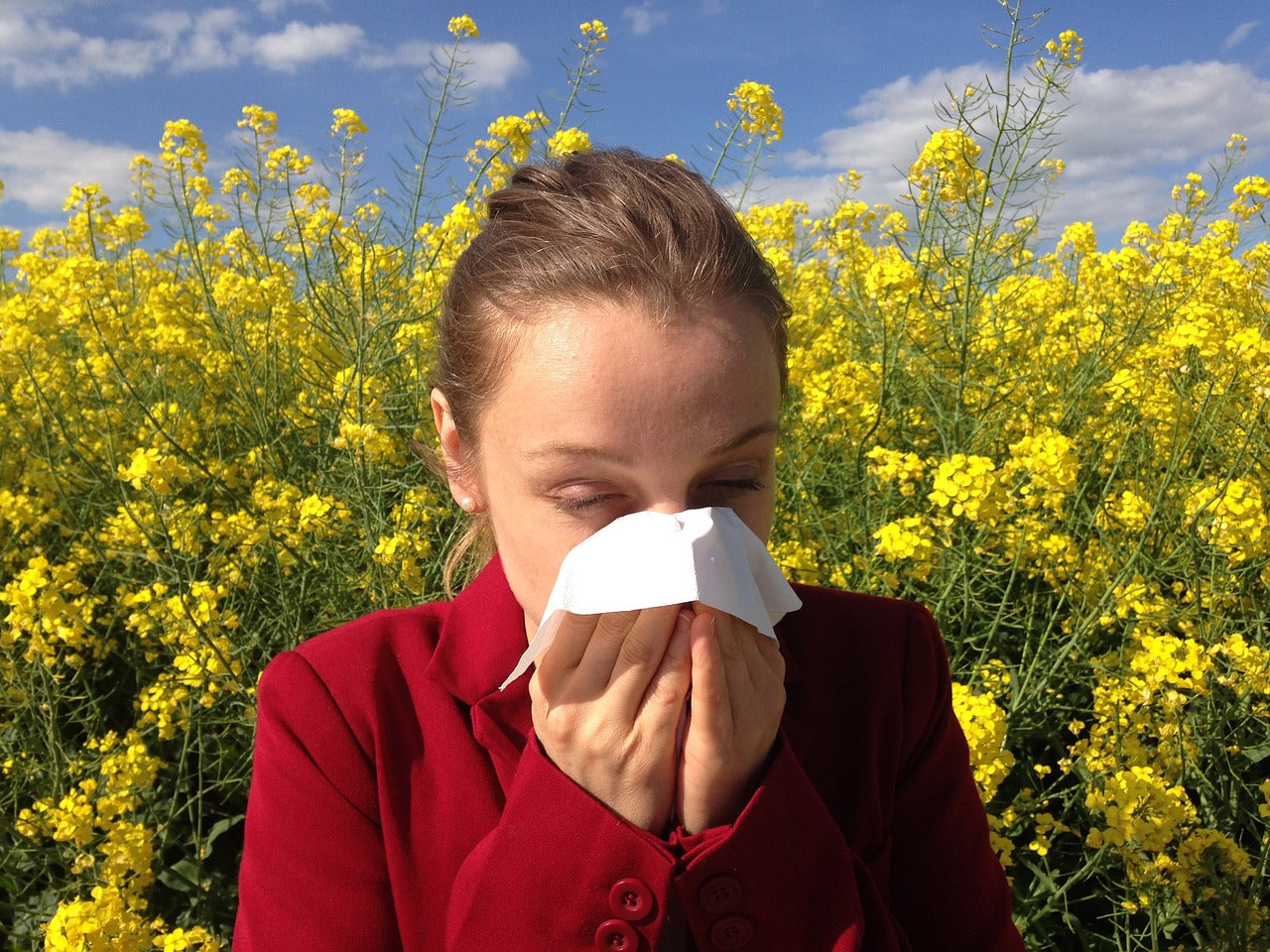
How To Stop Allergies - Naturally
Here in North Carolina allergy season is in full swing.
Truth is, it’s in full swing all over the United States. Except for Alaska, they’re still under a few feet of snow so they’re a few weeks’ behind.
And that means a lot of people suffering through stuffy noses, runny noses, itchy eyes, and congestion that never seems to end.
Most people assume that allergies are something they’ll simply have to suffer through in the spring and fall. But, that’s not necessarily the case.
Truthfully the only thing you have to suffer through in the spring are the NBA Championships.... Can you tell I was a collegiate soccer player?
In all seriousness just because you have allergies today doesn’t mean you’ll have to deal with them in the future.
Allow me to show you what you can do to help fight seasonal allergies.
In order to do that I also have to show you why allergies are on the rise.
Allergies Are On the Rise - Here’s the Best Guess Why
Part of the reason so many people feel like they’re forced to deal with a life of allergies is because allergies are on the rise.
Some people fight seasonal allergies their whole life long.
And others, people who’ve never once had to deal with allergies, have found themselves stocking up on Kleenex® and Claritin®.
Now, even though allergies are on the rise, we don’t know precisely why the number of people suffering from allergies continues to climb; but over the past 30 years more and more people complain about allergies.
I have my own suspicions.
I believe environmental toxins as well as a diet high in processed foods are the main culprits. Both toxins and processed foods have been linked to an increase in food allergies - and I’d imagine the same is true of allergic responses to pollen, grass, etc.
Since that’s likely the cause behind allergy rates climbing, it’s time to see how you can treat them.
For the most part I recommend dealing with allergies at the source. And that means changing diet, eliminating possible aggravants, and supplementing with nutrients known to help your body fight allergies.
NOTE: While I always defer to functional ways to eliminate allergies, it doesn’t mean I’m entirely against most OTC allergy treatments. Antihistamines are generally safe and effective, but if you can tame your allergy symptoms without them then I recommend you do.
OTC antihistamines do have certain side effects that are better to be avoided.
3 Powerful Ways to Combat Allergies
1 - Avoid known aggravants: In this case, a known aggravant is not the annoying dog that won’t shut up at night. Generally, these are foods, or additives in food, that can dampen your body’s ability to respond to allergenic material.
I love what Dr. Axe had to say in his article about aggravants to avoid:
“There are foods that you should avoid during allergy season. Any foods that you are allergic to, or have sensitivity to, should be avoided. If you’re not sure how far-reaching your food
sensitivities are, an elimination diet can help identify foods that can make your allergies worse.
Foods that commonly make hay fever symptoms worse include alcohol, caffeine, dairy, peanuts, sugar, wheat, citrus and chocolate. In addition, many common food preservatives — including sodium bisulfite, potassium bisulfite, sodium sulfite and artificial sweeteners — can contribute to your allergic rhinitis symptoms.
Avoid dried fruits, bottled citrus juice, shrimp and any highly processed foods. In addition, many people find relief when avoiding foods that cause mucus production — and it isn’t just dairy that contributes to mucus. Conventional dairy, gluten, sugar, caffeinated beverages, as well as any foods that you have sensitivity for can worsen your allergy symptoms.
If you have a ragweed allergy, it’s important to avoid melons, bananas, cucumbers, sunflower seeds, echinacea and chamomile, as they can trigger [an] allergic response in your system. The overall goal of limiting foods that you have sensitivity to is to lighten the overall burden on your immune system and allow it to function more optimally.”
2 - Eat restorative foods: You can help fight allergies simply by changing what kinds of foods you eat.
While avoiding some foods will keep allergy symptoms down, other foods will actually improve your quality of life by restoring and enhancing immune function.
I’m going to hit on the top 3, and then give you a small list at the end of other foods you can enjoy that’ll help lessen allergy symptoms.
-
Local honey: An interesting thing happens when bees make honey out of local pollen (one of the chief stimuli for allergies).
The pollen makes its way into the honey; when consumed by an individual, the honey can “inoculate” you to the harms of allergies. -
Bone broth: Bone broth is all the rage right now. That’s because we’ve found that bone broth contains proteins that help to fight inflammation while simultaneously promoting improved gut health.
When your gut is healthy it means your body’s immune system is improved, which will help to control allergy symptoms as well as encouraging the excretion of aggravants from the body in a more efficient fashion. -
Apple cider vinegar (ACV): Apple cider vinegar might be hard to swallow for some of you (literally) but it’s a great additive to your daily diet since it’ll help make your immune system healthy.
Not only does it help support immune health, ACV has been shown to help break up mucus that results from allergies as well as helping support lymphatic drainage.
Other foods that are great for helping out with allergies include:
Probiotic rich foods: yogurts, kombucha, natto. Pineapple (bromelain along with vitamin C, and E are shown to help allergies). Spicy foods of all stripes (they’re great at helping break up mucus and get your body’s natural drainage system flowing). Clean proteins: grass-fed beef, wild-caught fish, sustainably raised animal products.
3 - Supplement with allergy fighting compounds: Start with the first two recommendations and if you’re still not getting the relief you need then perhaps supplements may help.
I’m going to list what I recommend. But, remember, most of these supplements are nutrients that can be found in food too.
- Quercetin:500-1,000 mg. Found naturally in the skins of apples, this antioxidant helps to keep the production of histamines down.
- Spirulina: Not only is Spirulina a powerful plant superfood, it also helps to block the production of histamines.
- Vitamin A: 10,000 IUs. Vitamin A is a powerful anti-inflammatory and has antihistamine properties.
- Bromelain: 500mg. This is the digestive enzyme found in pineapple. It’s great at helping to fight inflammation and may reduce reactions to some allergens.
- Zinc: 50mg. Zinc is an essential nutrient that has great power to improve immune health. It also supports compromised hormone production that can sometimes result from allergens over-working the adrenal glands.
- Fish oil: A powerful anti-inflammatory, “one German study involving 568 people found that a high content of omega-3 fatty acids in red blood cells or in the diet was associated with a decreased risk of hay fever.”
- Sodium Ascorbate: 500mg. Sodium Ascorbate is a form of vitamin C. And, Vitamin C, as many of you know, is one of the most powerful antioxidants known to man. That antioxidant power doesn’t just guard your body from free-radical damage, it also helps to increase immune function too.
And there you have it.
A short, and by no means, an exhaustive list of ways to help treat allergens.
If you’d like to pick up any of the supplements (or all of them) from our store you can click on each of the supplement names above.
Or, you can click here and add them all into your cart at once.
I highly recommend you try out as many of these suggestions as you can if you want to avoid dealing with the frustration of allergies this season.
Talk Soon,
Dr. Wiggy
HealthAsItOughtToBe.com



